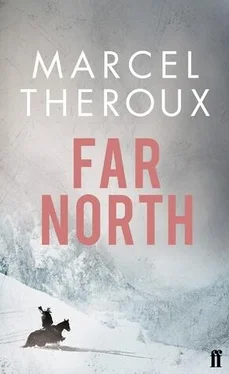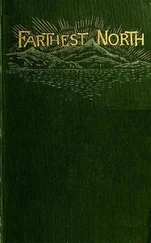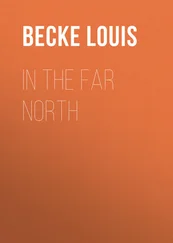Constabulary School was different. I was older. There were only a half-dozen of us and the time in the classroom didn’t seem endless. We had to study so quick. And there was something exciting about it. Sitting in school felt obedient. But we were disobeying so much just by being there. There was still so much anger towards us, even from our own families.
We were police. We were being trained to use violence. And our parents had come here because most of them were against the idea of using force, ever. My own family was too ashamed of what had happened to me to say anything about it, but of the others who were training with me, I knew how hard it was for them.
Me, I was a cuckoo. I never belonged in that world. I mean, I believe in being good. But so many of those people were wedded to appearing good. Like the Crashaws and the Steadmans, who had given up eating meat because it was ungodly.
And because of my nature, and my being a good shot, and because of everything that had happened to me, people in the city seemed pretty accepting of me.
The man who trained us was called Bill Evans. He came out from Alaska and they gave him a classroom above the bank to teach us in.
I loved Bill Evans. He was fat and crusty. He smoked and swore and he had no patience with city folk and their anxiety about being true to their founding principles and the long arguments about what to call us.
‘Too few, too late,’ he said. ‘Little Quaker village at the end of the world. You don’t need a police force. You need an army.’
Some families would have no truck with it. In spite of what was happening to their city, they preferred to move away. In spite of being robbed by hungry people. In spite of what happened to their daughters.
*
We provoked hate from people who said they didn’t believe in hate. Some would spit at us when we patrolled the town. The key was not to take it personal. They could feel the world they’d created slipping away, and we had become the symbol of it. The city was unsafe and they blamed us, the hated lawmen.
Now all that was ancient history. The towns were gone and the people thatpreyed on them had moved elsewhere. The Far North looked like it was me, and Horeb, and the scattered Tungus, and the ghost of a hope that tickled my chest with that piece of broken wing.
When Noah sends the birds out onto the flooded earth and one brings back a leaf — that was what the plane was to me. It meant we weren’t forgotten. Someone else had survived the flood. Someone was beached on Ararat and the waters were in retreat.
Sometimes I couldn’t help myself and I built a life in my head, planning what this new world would be like. And that’s when I felt I understood my father a little, because the world I wanted resembled the place he must have had in mind when he moved out to the Far North. And I realized that it wasn’t his fault. It was in the nature of the times. It was in the nature of the calamities that had struck our planet. People had all those possibilities in them, devil and angel, depending on how the times moved them. Like the seed that splits concrete, it was the appetite for life in them that made them so destructive. It was just everyone’s misfortune to be born in times when the wherewithal for living had got so scarce.
Well, it’s a fact with me that I like people more the less I see of them. And after two days of thinking like this I was almost ready to give the Reverend Boathwaite a hug. It may not seem it, but I have a soft heart. There’s a streak of fond soil in me that Ping put roots into, and they tore me up when she went.
*
I didn’t see any game the first day, but by a stroke of luck I stumbled onto some caribou on the morning of the second. In fact, when I held out my bare hand and yelled ‘ makh, makh ’, as though I had brought salt for them to lick, they came nosing up to find it. I knew from this they’d belonged to someone once.
Though they came up close, they soon dropped back when they learned there was no salt to be had, and they were leery of being roped. I could have chased around all day and not caught a single one of them, so I decided to work a little sideways.
I dropped my pants and crouched down, shuffling a little in my boots, to spread the piss around in the snow. You can’t keep caribou away from fresh piss. The heat and the salt is like apple pie to them. And while they were jostling each other to get to the freshest patches, I pulled up my pants and roped six of them.
It still wasn’t the easiest thing in the world to get them moving as a team. Every now and again, one or two would fix on a patch of lichen and I would have to tether the others while I tried to shift them, because I just wasn’t strong enough to manhandle all six. But it was gratifying to have gathered so much food, and I knew that with the hunger there was in Horeb there would be nothing wasted and they’d get eaten up hooves and all.
So we made our slow way back and arrived at the stockade towards late afternoon on the third day.
The gatekeeper slid open his spyhole and called for me to wait while he fetched the Reverend.
I greeted Boathwaite all friendly, since though I was tired I was proud of my haul, and the hard work seemed to have got the life flowing through me again. ‘I expect you’ll be wanting these,’ I said, and weigh my guns at him. He flinched, then saw I meant no harm, and smiled as he took them from me.
They must have fallen on me just as soon as I entered the gate, though my recollection of it is not clear. There was a heavy blow on my shoulders as though a branch had fallen on me, and a dull pain which made me sink to my knees.
I couldn’t tell you how many of them attacked me, or even what they used. The only face I remember belonged to the round-eyed boy I had met that first time in the woods, but now it was all snarled up with hate, and I could hear him screaming ‘traitor’ as he broke my arm with a club. I thought to myself, so this is how it is , and curled up, limp, on the ground since there was no way to fight all of them. But once I was down the beating eased, and they dragged me by my feet into a lean-to by the wall of the stockade that was not much bigger than a doghouse.
They gave me a few kicks as they squeezed me in it, and I lashed back at them, and called them foul names, saving my best expressions for the two-faced Reverend. Then someone had the idea of throwing a bucket of water on me to shut me up. It was still afternoon, but the air was cold enough that my damp clothes seemed to leech out all the heat in my bones. Still, I kept cursing them through clenched blue lips, knowing that if I fell unconscious now the cold might well finish me off. Luckily, the water had hit me at an angle and enough of my body was dry to keep me alive. But when they finally pulled me out, towards nightfall, I had ice in my hair and I was shivering as though racked with a fever.
Boathwaite and a few of the elders had set up chairs in the chapel. They sat me on a stool in the middle of them, lower than the others and placed so I had to twist according to who was addressing me. My hands and feet had been tied with rawhide thongs hard enough to cut into the skin and I had to half-hop, half-shuffle into their presence. And the break in my arm ached like hell every time I jarred it.
The Reverend had a sombre face on him and he told me he’d had no choice but to submit to the will of his flock in having me arrested.
I asked what possible reason they had for thinking that this was fair dealing towards me and one of the elders stood up in a rage and said, what right had a deceitful bitch like me to expect fair dealing? I said he was very brave in threatening me, bound as I was, but I still had no idea what I might have done to earn this hatred from them.
Читать дальше












